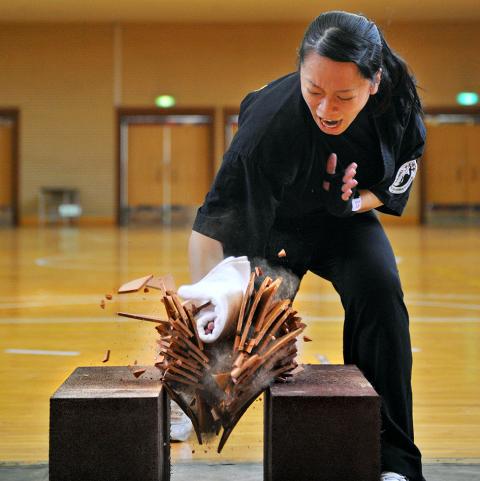A 135-member security task force which would ensure that all presidential candidates and their running mates campaign in safety was formed yesterday, a top security official said.
National Security Bureau (NSB) Director Tsai Der-sheng (蔡得勝) made the announcement while presiding over the conclusion of the force’s training and the launch of its mission for the Jan. 14 elections.
The task force, which is scheduled to be assisted by 30 specially trained police officers, is to be divided into three teams that will be responsible for the security of the three pairs of candidates running on the Chinese Nationalist Party (KMT), Democratic Progressive Party (DPP) and People First Party (PFP) tickets.

Photo: CNA
Eight of the 135 members are women, four of whom are to be assigned to protect DPP Chairwoman Tsai Ing-wen (蔡英文), Tsai Der-sheng said.
The deputy commander of the special security center, Wu Ying-ping (吳應平), said that for the sake of transparency and fairness, an open drawing of lots by Tsai Der-sheng will determine which members of the task force would be assigned to which of the three pairs of candidates.
Hsu Yen-ching (許燕情), deputy security officer for President Ma Ying-jeou (馬英九), is to lead the team charged with Ma’s security, DPP candidates Tsai and Su Jia-chyuan (蘇嘉全) would be the responsibility of a team led by Wu Tung-lin (吳東林), and Lin Wen-hao (林文豪) is to head the team scheduled to protect the PFP’s James Soong (宋楚瑜) and Lin Reuy-shiung (林瑞雄). The three team leaders all hold the rank of major-general.
Tsai Der-sheng said the task force would be responsible only for the candidates’ safety and nothing else. The agents would not be engaged in any activity not related to their official duties, he said.
Each team is to be assigned 12 vehicles, including a bullet-proof parade car, a bullet-proof sedan and a van.
Among the security-boosting equipment was a sensor system that can immediately detect where gunshots have originated from, enabling security agents to respond quickly in case shots are fired.
As far as anti-sniper efforts are concerned, each member of the security teams is scheduled to be equipped with an explosives detector, a bullet-proof file case, a hand-held X-ray machine, an explosion-proof blanket and a metal detector.
They are also to carry devices for detecting radioactive rays, chemical agents and biological poisons, along with T3-75 masks that protect users from radioactive fallout as well as biological and chemical attack.
During the commencement ceremony, the task force members demonstrated their abilities in hand-to-hand combat and shooting, as well as their responses to various scenarios that could occur during campaign rallies or while traveling from one campaign site to another.
Chiu Mei-yun (邱美雲), who has been part of similar task forces in two previous presidential elections, has been assigned to the team that is to protect Tsai Ing-wen.
In spite of her previous experience, Chiu said she still feels great pressure for her coming duty.
The task force teams are scheduled to be deployed at the six candidates’ residences, offices and campaign sites.
The teams will officially be responsible for the safety of the candidates until midnight on Jan. 14.

An essay competition jointly organized by a local writing society and a publisher affiliated with the Chinese Communist Party (CCP) might have contravened the Act Governing Relations Between the People of the Taiwan Area and the Mainland Area (臺灣地區與大陸地區人民關係條例), the Mainland Affairs Council (MAC) said on Thursday. “In this case, the partner organization is clearly an agency under the CCP’s Fujian Provincial Committee,” MAC Deputy Minister and spokesperson Liang Wen-chieh (梁文傑) said at a news briefing in Taipei. “It also involves bringing Taiwanese students to China with all-expenses-paid arrangements to attend award ceremonies and camps,” Liang said. Those two “characteristics” are typically sufficient

A magnitude 5.9 earthquake that struck about 33km off the coast of Hualien City was the "main shock" in a series of quakes in the area, with aftershocks expected over the next three days, the Central Weather Administration (CWA) said yesterday. Prior to the magnitude 5.9 quake shaking most of Taiwan at 6:53pm yesterday, six other earthquakes stronger than a magnitude of 4, starting with a magnitude 5.5 quake at 6:09pm, occurred in the area. CWA Seismological Center Director Wu Chien-fu (吳健富) confirmed that the quakes were all part of the same series and that the magnitude 5.5 temblor was

The brilliant blue waters, thick foliage and bucolic atmosphere on this seemingly idyllic archipelago deep in the Pacific Ocean belie the key role it now plays in a titanic geopolitical struggle. Palau is again on the front line as China, and the US and its allies prepare their forces in an intensifying contest for control over the Asia-Pacific region. The democratic nation of just 17,000 people hosts US-controlled airstrips and soon-to-be-completed radar installations that the US military describes as “critical” to monitoring vast swathes of water and airspace. It is also a key piece of the second island chain, a string of

The Central Weather Administration has issued a heat alert for southeastern Taiwan, warning of temperatures as high as 36°C today, while alerting some coastal areas of strong winds later in the day. Kaohsiung’s Neimen District (內門) and Pingtung County’s Neipu Township (內埔) are under an orange heat alert, which warns of temperatures as high as 36°C for three consecutive days, the CWA said, citing southwest winds. The heat would also extend to Tainan’s Nansi (楠西) and Yujing (玉井) districts, as well as Pingtung’s Gaoshu (高樹), Yanpu (鹽埔) and Majia (瑪家) townships, it said, forecasting highs of up to 36°C in those areas